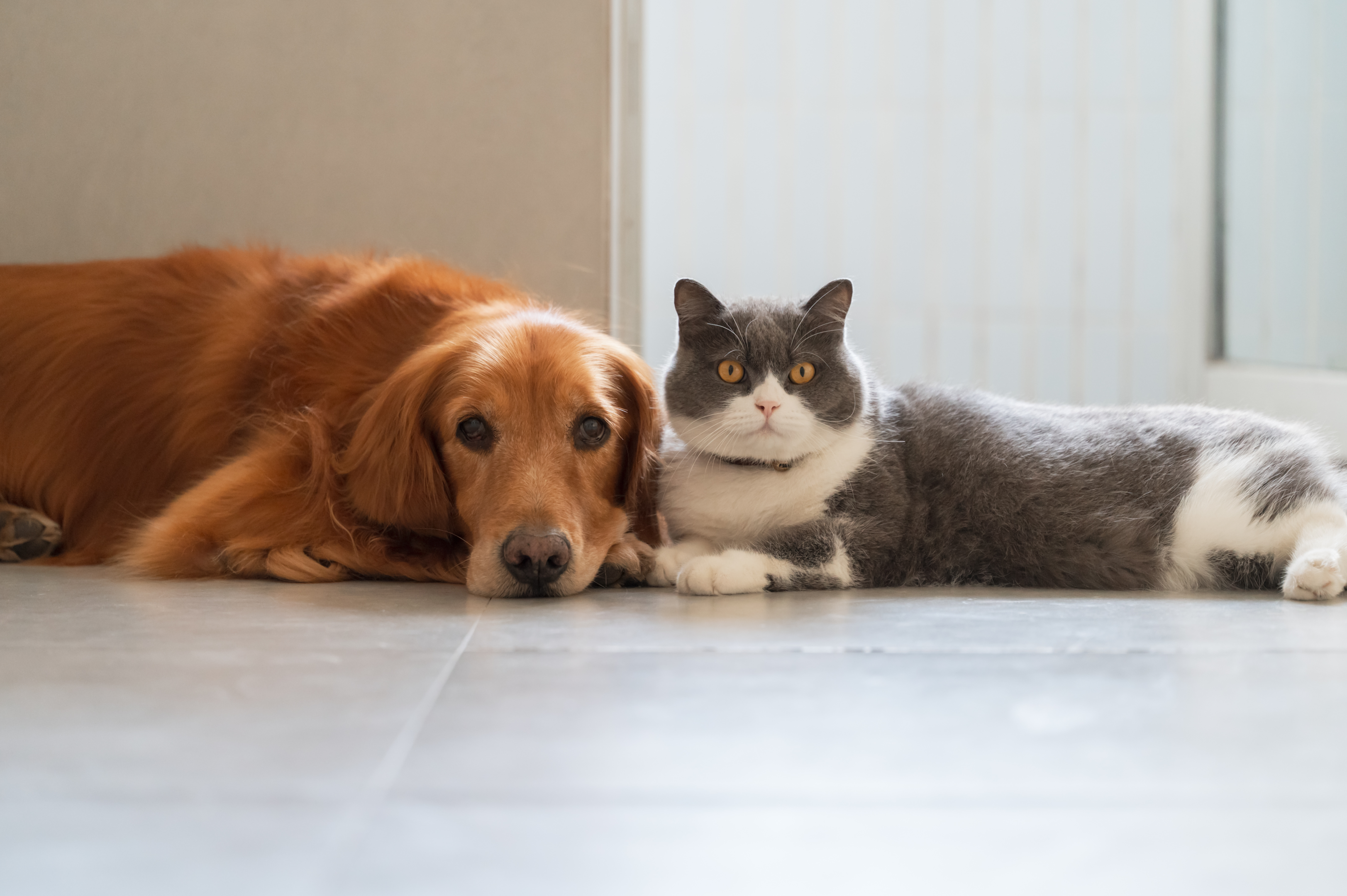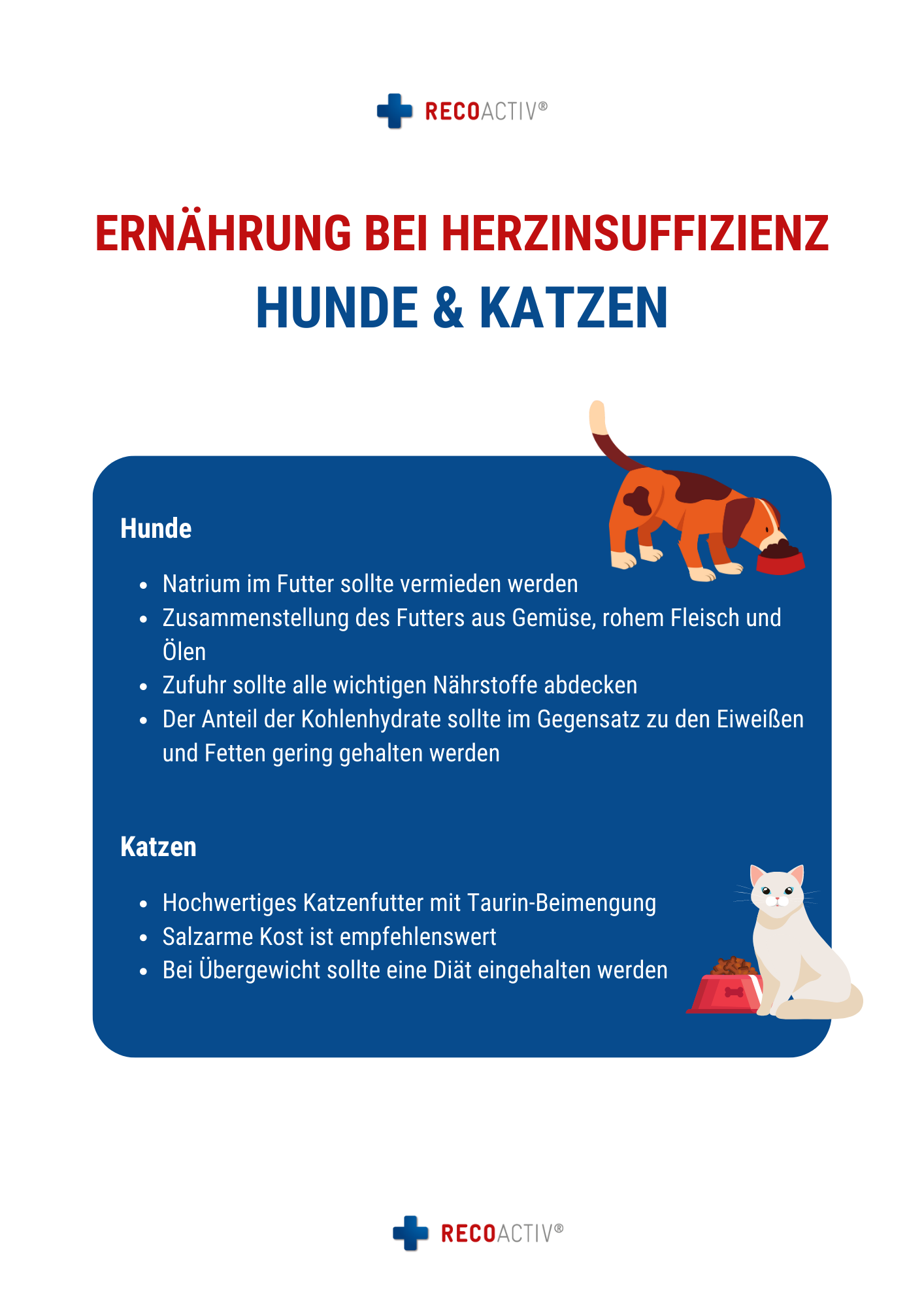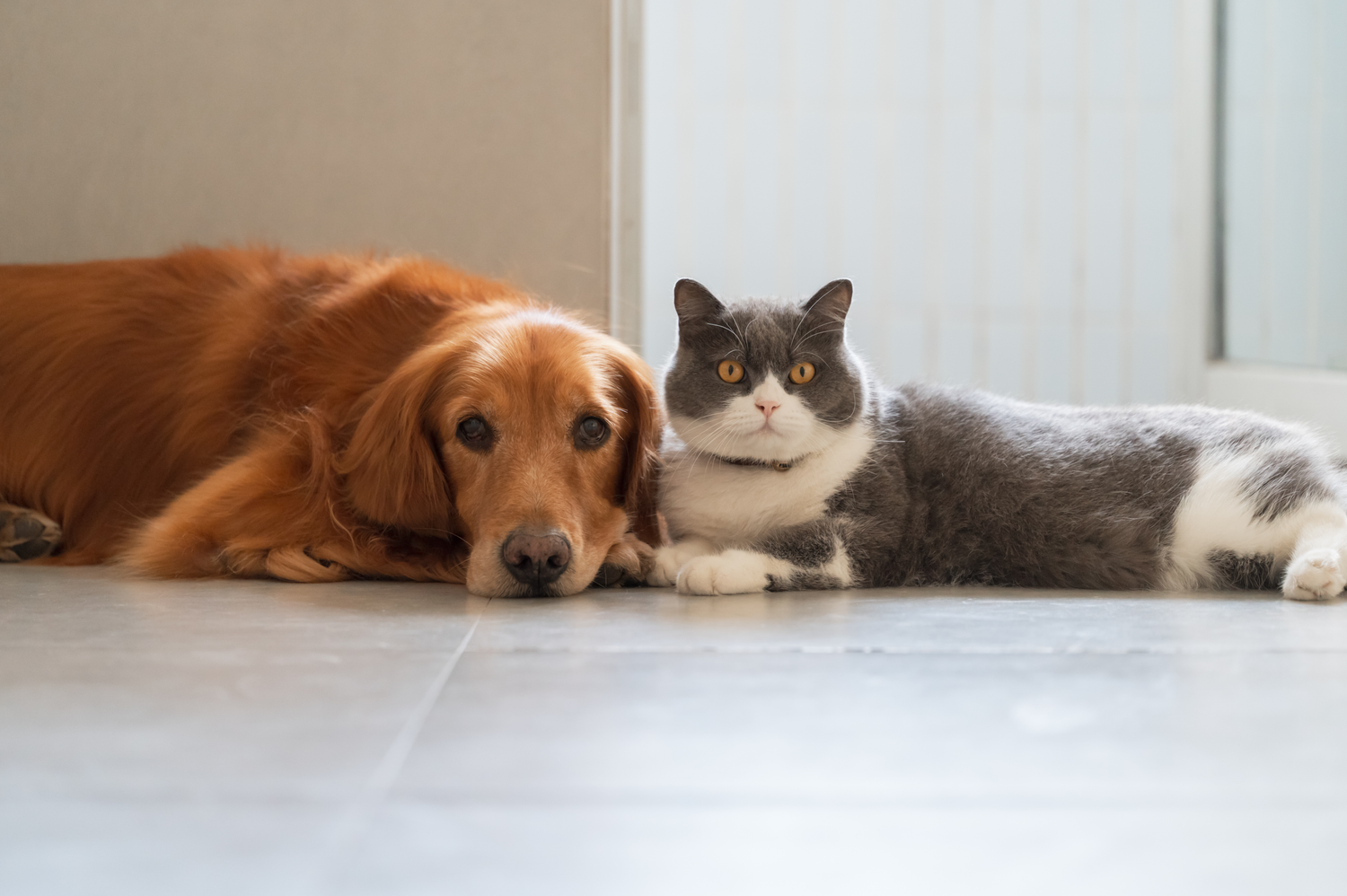What exactly is heart failure in animals?
Cat and dog owners primarily want one thing: for their pet to stay healthy for as long as possible. Unfortunately, this wish isn't always fulfilled. A beloved animal might suffer from heart failure. But how is this diagnosed, and what can be done to treat the condition?
In this guide, we will discuss the topic in detail and provide important tips for owners of dogs and cats.

What exactly is heart failure in animals?
Heart failure (cardiac insufficiency) means that the heart's pumping capacity is severely impaired. This slows blood flow throughout the body, leading to an insufficient supply of oxygen to the organs. The condition can be acute or chronic.
If an animal suffers from heart failure , it means that the heart's pumping capacity is severely limited . This, in turn, impairs blood flow throughout the body, so that it no longer occurs in sufficient quantity or speed. Heart failure is therefore also called cardiac insufficiency .
One of the blood's most important functions is to transport oxygen from the lungs to all organs. However, if circulation is insufficient , the body can become oxygen-deprived.
Heart failure in dogs and cats can occur acutely or chronically . While acute heart failure is characterized by a sudden and rapid decline in pumping capacity, chronic heart failure progresses gradually, leading to various impairments in the lives of affected animals.
What symptoms indicate heart failure in dogs and cats?
Possible symptoms include reluctance to move, drowsiness, coughing (especially in the morning or when excited), shortness of breath, and an increased respiratory rate (around 30 times per minute). Heart disease often begins gradually and initially manifests only as a heart murmur.
It is often older cats and dogs that show symptoms of heart failure. The following symptoms may occur:
- Reluctance to move and drowsiness
- Cough (usually in the morning after getting up or when excited, but also possible all day as the disease progresses)
- Shortness of breath
- Increased respiratory rate (approximately 30 times per minute)
Many heart conditions go unnoticed at first. This is because they often begin gradually , so the animals initially show no symptoms. The first sign can be a heart murmur , which can be heard during an examination with a stethoscope. However, this is not necessarily cause for immediate concern.
Further observation of the animal and a possible echocardiogram will provide more precise information. This will also reveal the extent to which the heart is already affected by the heart defect.
For animals suffering from heart failure, particular attention must be paid to a proper and balanced diet . Dietary supplements and salmon oil for dogs can make an important contribution to maintaining their quality of life.
What causes heart failure?
Heart disease can be congenital or acquired later in life. The most common causes are age-related changes in the heart valves, bacterial infections due to heavy tartar buildup, and the stretching (dilation) or thickening of the heart muscle (hypertrophic cardiomyopathy, HCM, often seen in purebred cats such as the Maine Coon).
Heart disease in cats and dogs can be either congenital or acquired . It is possible for different areas of the heart, including the heart muscle, to be affected. The following causes are possible:
- Changes in the heart valves due to age.
- Severe tartar buildup and associated bacterial infections: Bacteria can enter the bloodstream through the gums and attack the valve structure of the heart.
- Dilation (loosening) of the heart muscle: The heart muscle wall becomes thin and the heart enlarges, thereby losing its contractility. This can lead to a backup of blood (pulmonary edema).
- Hypertrophic cardiomyopathy (HCM): The heart muscle thickens and becomes less flexible, which means it can no longer beat strongly enough. This often occurs in purebred cats such as the Maine Coon.
What is the optimal treatment for heart failure?
Treatment is usually long-term and includes medication (e.g., ACE inhibitors to relieve the strain on the heart, drugs to improve heart rate) and dietary changes. If blood backs up into the lungs (pulmonary edema), diuretics are also administered.
Since heart disease is usually a progressive process , it is first necessary to determine the current state of the heart. Doctors can do this with a cardiac ultrasound examination.
In many cases , ACE inhibitors are used to relieve the strain on the heart. These drugs dilate the small blood vessels and reduce the pressure against which the heart has to pump. If, however, the heart is no longer able to beat with sufficient force, other medications are often used to improve the heart's pumping strength .
If there is a backup of blood in the lungs, pulmonary edema can occur, which is best countered with additional drainage .
What kind of diet is important for cats with heart failure?
For cats, an adequate intake of taurine (usually found in high-quality food) and ideally a low-salt diet are important. Furthermore, excess weight should be avoided or reduced through a veterinarian-approved diet to prevent additional strain on the heart.
Cats suffering from heart failure absolutely must consume sufficient taurine in their diet. This is usually already present in adequate amounts in high-quality cat food. Furthermore, it can be beneficial to feed the sick cat a low-salt diet . If the cat refuses food, this should never be ignored, as it can lead to a deficiency in essential nutrients .
It is also important that the cat does not gain excessive weight , as the extra pounds could put additional strain on its heart. If the cat is already overweight, a veterinarian-approved diet should be followed to help it return to a healthy weight.
What is the prognosis for cats with heart failure?
If appropriate therapy is started early, the chances of a good prognosis increase, and with ongoing treatment and regular check-ups, the cat can lead a largely normal life with a good quality of life. If the heart disease is advanced and accompanied by pulmonary edema, the prognosis worsens.
To make a prognosis for cats with heart failure, the causes of the heart problems must be known. Starting therapy early increases the chances of a good prognosis. However, if the heart disease is already more advanced and possibly even accompanied by pulmonary edema, the prognosis is often less favorable.
Cats that receive proper treatment can, however, lead largely normal lives with a good quality of life. This requires ongoing treatment and regular check-ups at the veterinary clinic .
What diet is recommended for dogs with heart failure?
It is recommended that dogs with heart failure not be fed commercially produced food, as this often contains too much sodium. A BARF diet (raw meat, vegetables, oils) with high-quality muscle meat and a high proportion of fats and proteins is better, which can also prevent the formation of tartar and thus further heart problems.
Dogs suffering from heart failure should ideally not be fed commercially produced food. This type of food usually contains excessive amounts of sodium , which is particularly harmful in advanced stages of heart failure.
It's better if dog owners feed their pets a raw diet (BARF). This means preparing the food themselves from raw meat, vegetables, and oils . It's important to use fresh, high-quality muscle meat . This type of diet must provide the dog with all the necessary nutrients .
The majority of energy should come from fats and proteins , rather than carbohydrates. This allows for better absorption and metabolism of nutrients. Another important point is that this diet can prevent tartar buildup . Furthermore, chewing large, meaty pieces is an effective preventative measure against periodontal disease and tooth decay . Dental problems in dogs often lead to heart problems, and a healthy raw food diet can help prevent both.
What is the prognosis for dogs with heart failure?
If heart failure is detected quickly and early therapy with correct medication is initiated, the prognosis for chronic heart disease improves. In large dogs, the disease often progresses more rapidly, and in the case of pulmonary edema (end stage), the predicted lifespan is often less than one year.
Heart failure in dogs can have various causes. However, these are rarely curable . If heart failure is detected early, treatment can be initiated promptly . Correct medication management improves the prognosis for chronic heart disease.
However, if heart failure in dogs is left untreated or occurs acutely, it is fatal in most cases.

Is it possible to prevent heart failure?
Unfortunately, targeted prevention of heart failure is not possible. However, it is important to ensure the animal has a healthy lifestyle, avoid obesity and lack of exercise, and regularly feed it high-quality food that provides all essential nutrients.
Unfortunately, targeted prevention of heart failure is not possible. However, it's important to ensure that your pet doesn't suffer from a lack of exercise or obesity. Generally, a healthy lifestyle for your dog or cat is essential. This includes providing them with regular, high-quality food that supplies all the necessary nutrients.
However, self-treatment is by no means advisable . This is simply not possible because affected animals often require specific medication .
Frequently Asked Questions (FAQ) about Heart Failure
How long can a cat with heart failure live?
If heart failure in cats is detected early and then regularly monitored, they can live with the disease for many years. However, if fluid has already accumulated in the lungs, the cat's prognosis worsens considerably.
How does heart failure manifest itself in cats?
Cats with heart disease may exhibit symptoms such as loss of appetite, lethargy, labored or labored breathing, open-mouth breathing or panting, and fainting. Some cats also cough noticeably, but this alone is not necessarily a sign of heart disease.
How does heart failure manifest itself in dogs?
Dogs with heart failure can exhibit similar symptoms to cats, including fatigue, loss of appetite, restlessness, and reduced performance.
How long can a dog with heart failure live?
In large dogs, the disease often progresses considerably faster. If the affected dog is in the final stage and already has fluid in the lungs (so-called pulmonary edema), the prognosis for life is often less than one year.
Conclusion
Heart failure in dogs and cats is a serious condition that often leads to significant limitations in the lives of affected animals. They frequently suffer from various symptoms, ranging from a mild cough to shortness of breath. Apathy and reluctance to move are also possible warning signs.
If you suspect your pet has heart failure, it should be examined at a veterinary clinic as soon as possible. Veterinarians can perform thorough blood and urine tests, as well as ultrasound examinations, to make an accurate diagnosis .
Treatment options include medication and dietary changes . The latter can be particularly beneficial if the animal is already in the second half of its life or if it has a genetic predisposition for heart disease. Both L-carnitine and taurine are present in high concentrations in the heart muscle. A deficiency can therefore prevent the heart muscle from contracting sufficiently. This results in reduced blood flow to organs and tissues, which in turn increases the likelihood of developing other diseases.

